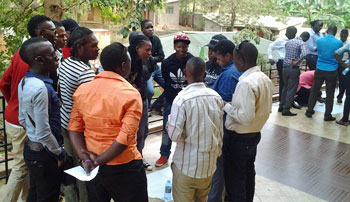A step toward opening HIV care to LGBTI Ugandans
Colin Stewart is a 45-year journalism veteran living in Southern…

LGBTI people, sex workers and drug users in Uganda have moved a step closer to having representatives on the health policy panel that could improve their access to HIV services.
A previous election to choose representatives of those key population groups — groups with elevated risk of HIV infection — was ruled invalid earlier this month on procedural grounds. As a result, those groups still have no official representatives on the Ugandan health policy panel known as the Country Coordinating Mechanism (CCM).
In a gathering at Kampala’s Grand Global Hotel on Jan. 29, five key population groups chose five nominees each for seats on the CCM panel. In a new election scheduled for Feb. 5, those nominees will meet and choose a total of two of their number to serve on the CCM.
The CCM oversees programs and makes key decisions about requests for funding from the Global Fund to Fight AIDS, Tuberculosis and Malaria, which finances many of Uganda’s anti-AIDS efforts.
Kuchu Times reported that Sexual Minorities Uganda (SMUG) has been seeking representation on the CCM since 2010, according to SMUG executive director Frank Mugisha. In the past, he said, because effective representation was lacking, key affected populations have not benefited from Global Fund projects.
The Global Fund now requires every nation’s CCM to include representatives of key affected populations, because their health needs have often been neglected in many countries, particularly in those, like Uganda, where same-sex intimacy is a criminal offense.
For example, among Ugandan men who have sex with men (MSM), the HIV infection rate is an estimated 12 to 33 percent, compared to 7.3 percent for all Ugandans.
In the nomination results from Jan. 29:
- Drug users selected five nominees from Mbale, Wakiso, Gheto Youth-Kampala-Kawempe Division, Nakasongola and Kampala Central Division.
- Sex workers selected five nominees from Kampala (2), Mbarara, Malaba and Gulu).
- MSM and transgender groups each selected five nominees.
- Another group of key affected populations, including LGBTI, selected five nominees, including Mugisha of SMUG and Kikonyogo Kivumbi of the Uganda Health and Science Press Association.
Related articles:
- Uganda: Key affected populations in Uganda nominate their representatives to the Global Fund CCM (Kuchu Times)
- Uganda LGBTI get 2nd chance to elect legitimate reps (76crimes.com)
- Anti-AIDS activists hope, but fear, Ugandan patent law (76crimes.com)
- Anti-gay Uganda today (4): Excluding gays from HIV care (76crimes.com)
- Dispute over LGBTI clinics in Uganda (76crimes.com)
- Uganda’s anti-gay law will make AIDS harder to fight (76crimes.com)
- Uganda activists still busy, though fearful (76crimes.com)
- Will AIDS activist’s death boost HIV support services? (76crimes.com)
- Uganda study probes anti-gay acts, offers brighter future (76crimes.com)




Reblogged this on Peterson Ssendi and commented:
A step toward opening HIV care to LGBTI Ugandans
Reblogged this on Fairy JerBear's Queer World News, Views & More From The City Different – Santa Fe, NM and commented:
A bit of progress in Uganda…